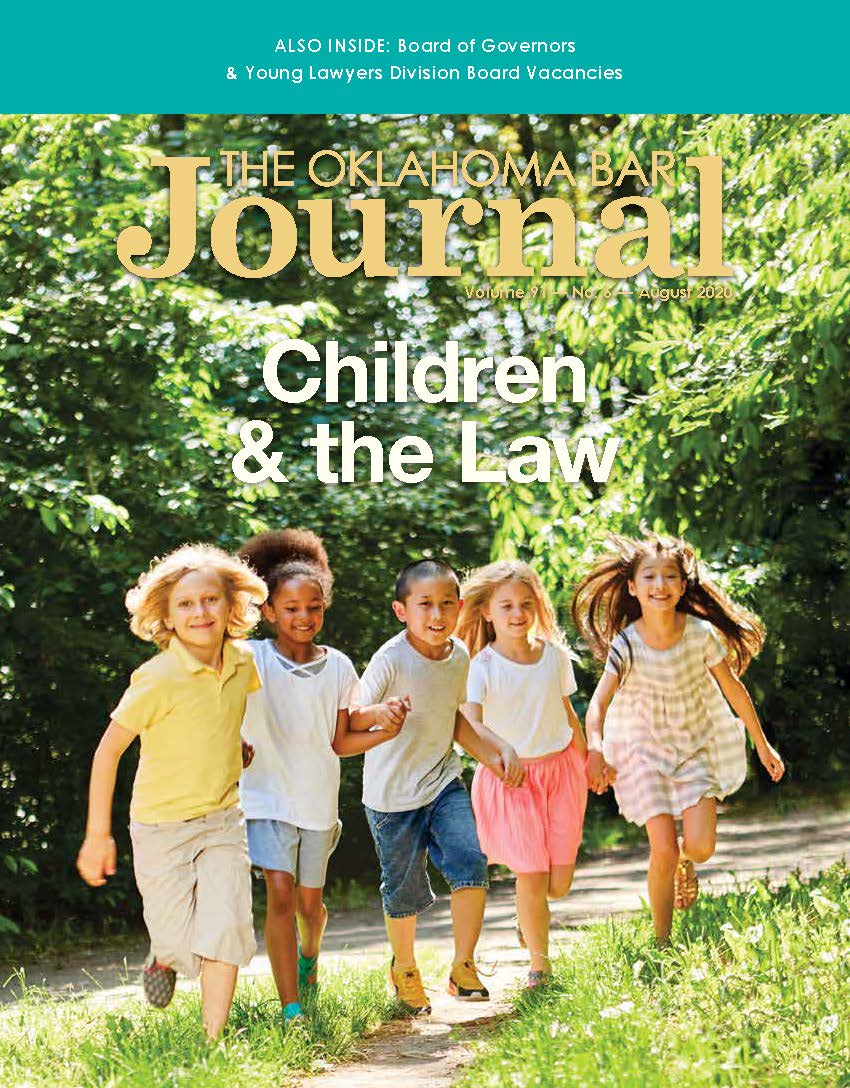Oklahoma Bar Journal

August 2020 | Children & the Law
Feature Articles
Trial By Jury: Unequal Protection for Oklahoma’s Abused and Neglected Children
Oklahoma is the only state that specifically provides parents of abused and neglected (deprived) children a constitutional right to a jury when terminating the parent-child relationship (termination)1. The story of how Oklahoma became the only state with such a specific jury right extends over four decades, beginning with the 1960s bribery scandal and ending in a 1997 Oklahoma Supreme Court decision.
Highlights from the Interim Report: Oklahoma Task Force on the Uniform Representation of Children and Parents in Cases Involving Abuse and Neglect
On July 22, 2019, the Oklahoma Supreme Court approved the establishment of a task force to study and report on legal representation of children and parents in legal proceedings set forth in the Oklahoma Children’s Code, 10A O.S. 1-1-101 et seq.1 The task force was required to produce an interim report2 in February of this year. The following are highlights from that report.
Changes Affecting Deprived and Delinquent Proceedings
Laws applicable to deprived and delinquent matters are ever changing, albeit often in nuanced ways. A full understanding of deprived cases requires judges, attorneys, caseworkers and other court partners to appreciate the intermingling of legislation and case law governing foster care, adoptions, the Department of Human Services (DHS), mental health treatment and more. While delinquent dockets employ a different set of laws, a similar complex analysis is required to reach proper results. This article provides legislative and case law updates to the areas of deprived and delinquent law.1
Through the Looking Glass of Child Welfare Services in Oklahoma
Herbert Hoover once said, “Children are our most valuable resource.”1 Title 10A of the Children and Juvenile Code is the statutory authority and the Oklahoma Department of Human Services (OKDHS) is the agency that helps protect these “valuable resources.” OKDHS was created in 1936 during the Great Depression. It was first called the Department of Public Welfare, with a nine-member commission and a director to carry out the mission stated in Article XXV of the Oklahoma Constitution: “the relief and care of needy aged persons who are unable to provide for themselves, and other needy persons who, on account of immature age, physical infirmity, disability, or other cause, are unable to provide or care for themselves…”2
Attachment: The Foundation of Relationships and the Impact of Trauma in the Lives of Children
Rebecca, a healthy 35-year-old female, received prenatal care throughout her pregnancy and chose an adoptive family for her baby. She is a successful and independent person who chose not to raise her child as the father was not involved. At 40 weeks, she delivered a healthy baby boy, who was immediately held and loved on by his soon-to-be adoptive mother and father. They named the baby Sam. Sam is a child of trauma.
Guardianship of Minors: A Summary of Title 10 and Title 30 Guardianships
This article covers guardianships permitted in Title 10 and Title 30 of the Oklahoma Statutes. For information on custody and guardianship actions filed pursuant to Title 43, please see 43 O.S. §112, et seq. For information on guardianships made pursuant to the Children and Juvenile Code, please see 10 O.S. §1-4-709, et seq.
